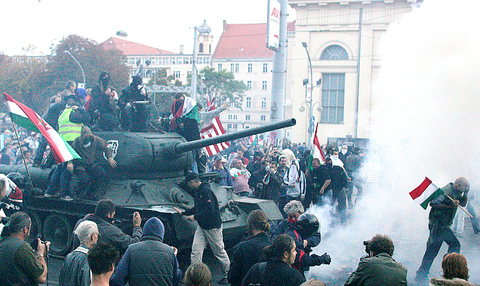Hungarian police yesterday braced for further violence a day after Budapest was rocked by riots on the 50th anniversary of the uprising against Soviet rule.
"We are prepared for a return to violence and can guarantee law and order," national police spokesman Tibor Jarmy said.
He said police reinforcements sent from the countryside yesterday to battle anti-government protesters would stay in the capital "for the time being."

PHOTO: AP
Outside parliament, where over a dozen European heads of state attended ceremonies on Monday to commemorate the uprising, an area where far-right extremists had held demonstrations for more than a month remained cordoned off.
"We still consider this an area for police operations," Jarmy said.
On Monday, police fired rubber bullets, tear gas and water cannons at thousands of mostly far-right protesters on the streets of the capital as commemorations of the uprising descended into chaos.
Authorities said 128 injuries were reported and some 100 people were arrested.
"An aggressive minority is terrorizing us. We have to defend the country," Prime Minister Ferenc Gyurcsany told public TV late on Monday after an emergency session of the national security Cabinet.
There were fears the riots could bring a return of the chaos triggered last month by a leaked recording in which Gyurcsany said he had lied to voters about the economy to win re-election in April.
Those protests, which lasted over a month, degenerated into riots over three nights, leaving hundreds injured.
The leader of the main right-wing opposition Fidesz party, former prime minister Viktor Orban, used the Gyurcsany recording to compare the premier to Soviet oppressors, saying both had "lied" to the country, an analogy that has been dismissed by historians.
Orban told tens of thousands of his supporters on Monday that "an entire country has turned against this illegitimate government."
He had organized a separate rally after boycotting official ceremonies, thus torpedoing efforts to put on a show of national unity for the uprising anniversary.
Gyurcsany said on Monday that politicians should not confuse current political differences with the uprising.
"1956 was about the fight for freedom, while 2006 is about the order of freedom and democracy ... The 1956 revolution was replaced by the debates of a democracy," he told parliament.
In his speech Monday, Orban said he wanted to hold a series of referendums on the government's economic reforms, which some saw as his latest attempt to grab power after losing two parliamentary elections to the left.
"We cannot doubt that the referendums are a Trojan horse with only one aim, to prepare for a `democratic' takeover of power," centrist daily Magyar Hirap said in an editorial yesterday.
The reforms are unpopular because they include austerity measures aimed at reining in Hungary's public deficit, the highest in the EU, and preparing the country to adopt the euro.
Earlier this month, Orban organized more than two weeks of protests in an effort to pressure Gyurcsany to resign after the left lost Oct. 1 local government polls.

NO EXCUSES: Marcos said his administration was acting on voters’ demands, but an academic said the move was emotionally motivated after a poor midterm showing Philippine President Ferdinand Marcos Jr yesterday sought the resignation of all his Cabinet secretaries, in a move seen as an attempt to reset the political agenda and assert his authority over the second half of his single six-year term. The order came after the president’s allies failed to win a majority of Senate seats contested in the 12 polls on Monday last week, leaving Marcos facing a divided political and legislative landscape that could thwart his attempts to have an ally succeed him in 2028. “He’s talking to the people, trying to salvage whatever political capital he has left. I think it’s

Polish presidential candidates offered different visions of Poland and its relations with Ukraine in a televised debate ahead of next week’s run-off, which remains on a knife-edge. During a head-to-head debate lasting two hours, centrist Warsaw Mayor Rafal Trzaskowski, from Polish Prime Minister Donald Tusk’s governing pro-European coalition, faced the Eurosceptic historian Karol Nawrocki, backed by the right-wing populist Law and Justice party (PiS). The two candidates, who qualified for the second round after coming in the top two places in the first vote on Sunday last week, clashed over Poland’s relations with Ukraine, EU policy and the track records of their

UNSCHEDULED VISIT: ‘It’s a very bulky new neighbor, but it will soon go away,’ said Johan Helberg of the 135m container ship that run aground near his house A man in Norway awoke early on Thursday to discover a huge container ship had run aground a stone’s throw from his fjord-side house — and he had slept through the commotion. For an as-yet unknown reason, the 135m NCL Salten sailed up onto shore just meters from Johan Helberg’s house in a fjord near Trondheim in central Norway. Helberg only discovered the unexpected visitor when a panicked neighbor who had rung his doorbell repeatedly to no avail gave up and called him on the phone. “The doorbell rang at a time of day when I don’t like to open,” Helberg told television

‘A THREAT’: Guyanese President Irfan Ali called on Venezuela to follow international court rulings over the region, whose border Guyana says was ratified back in 1899 Misael Zapara said he would vote in Venezuela’s first elections yesterday for the territory of Essequibo, despite living more than 100km away from the oil-rich Guyana-administered region. Both countries lay claim to Essequibo, which makes up two-thirds of Guyana’s territory and is home to 125,000 of its 800,000 citizens. Guyana has administered the region for decades. The centuries-old dispute has intensified since ExxonMobil discovered massive offshore oil deposits a decade ago, giving Guyana the largest crude oil reserves per capita in the world. Venezuela would elect a governor, eight National Assembly deputies and regional councilors in a newly created constituency for the 160,000